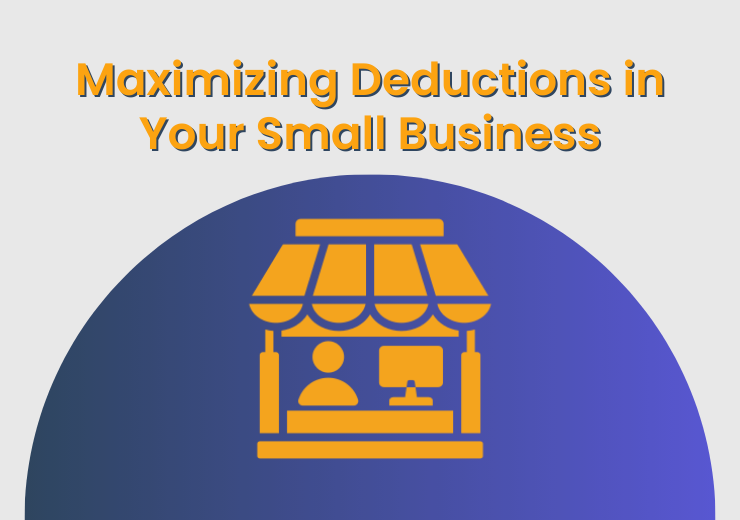Running a small business comes with its own set of financial challenges. However, one of the perks of being a small business owner is the ability to take advantage of various deductions to minimize taxable income and maximize profits. Understanding how to navigate through the labyrinth of tax deductions can significantly benefit your bottom line. In this ultimate guide, we’ll explore strategies to help you maximize deductions in your small business effectively.
Introduction to Maximizing Deductions in Small Businesses
As a small business owner, it’s crucial to grasp the concept of deductions and how they can impact your overall financial health. Deductions are expenses that businesses can subtract from their taxable income, thereby reducing the amount of income subject to taxation. By leveraging deductions, you can keep more money in your pocket, allowing you to reinvest in your business growth.
Understanding the Importance of Deductions
Deductions play a vital role in the financial success of small businesses for several reasons. Firstly, they help lower your taxable income, which means you’ll owe less in taxes to the government. Secondly, deductions can improve your cash flow by reducing the amount of money you need to pay in taxes upfront. Lastly, maximizing deductions allows you to allocate more resources toward business expansion, innovation, and employee benefits.
Types of Deductions Available for Small Businesses
Common Business Expenses Eligible for Deductions
Office Expenses
Maintaining a functional workspace is essential for small business operations. Expenses such as rent, utilities, and office supplies are all deductible. Additionally, equipment purchases, such as computers and furniture, can also be deducted either in full or through depreciation over time.
Employee Salaries and Benefits
Wages, salaries, and bonuses paid to employees are typically tax-deductible for businesses. Moreover, contributions to employee benefit plans, such as health insurance and retirement accounts, can also be deducted as business expenses.
Marketing and Advertising Expenses
Investing in marketing and advertising is crucial for attracting new customers and growing your business. Fortunately, expenses related to marketing campaigns, website development, and promotional materials are all deductible.
Specialized Deductions for Small Businesses
Section 179 Deductions
Section 179 of the IRS tax code allows businesses to deduct the full purchase price of qualifying equipment and software purchased or financed during the tax year. This deduction is especially beneficial for small businesses looking to invest in capital assets.
Qualified Business Income Deduction (QBI)
The Qualified Business Income deduction, also known as the pass-through deduction, allows eligible small business owners to deduct up to 20% of their qualified business income from their taxable income. This deduction can significantly reduce the tax burden for small business owners operating as sole proprietors, partnerships, or S corporations.
Keeping Meticulous Records for Deductions
Maintaining accurate financial records of your business expenses is essential for maximizing deductions and avoiding potential audits. Be sure to keep all receipts, invoices, and financial statements organized and easily accessible. Consider using accounting software or hiring a professional bookkeeper to streamline the record-keeping process.
Leveraging Technology for Deduction Tracking
In today’s digital age, there are countless software tools and apps available to help small business owners track their expenses and maximize deductions. From cloud-based accounting platforms to mobile receipt scanners, technology can simplify the deduction tracking process and ensure compliance with tax regulations.
Seeking Professional Advice for Complex Deductions
While many deductions are straightforward, some tax laws and regulations can be complex and confusing. In such cases, it’s wise to seek advice from a qualified tax professional or accountant who specializes in small business taxes. They can provide valuable insights and guidance on maximizing deductions while minimizing the risk of costly mistakes.
Maximizing Deductions Through Strategic Planning
Strategic tax planning is essential for maximizing deductions and optimizing your overall tax strategy. Consider timing your expenses strategically to maximize deductions in high-tax years and minimize them in low-tax years. Additionally, explore alternative business structures and retirement plans that offer additional tax benefits for small business owners.
The Importance of Staying Updated on Tax Laws
Tax laws and regulations are subject to change, making it crucial for small business owners to stay informed and up-to-date on any new developments. Subscribe to relevant newsletters, attend seminars, and consult with tax professionals regularly to ensure compliance and take advantage of any new deduction opportunities.
Conclusion
Maximizing deductions in your small business is not only a smart financial strategy but also a legal and ethical way to minimize your tax liability. By understanding the various types of deductions available, keeping meticulous records, leveraging technology, seeking professional advice, and engaging in strategic tax planning, you can optimize your tax strategy and keep more money in your pocket.
Unique FAQs
-
What are some often overlooked deductions for small businesses?
- Answer: Some commonly overlooked deductions include home office expenses, business travel expenses, and professional development costs.
-
Can I deduct expenses if my business operates at a loss?
- Answer: Yes, you can still deduct business expenses even if your business operates at a loss. However, there may be limitations based on your business structure and the type of expenses incurred.
-
Are there any deductions specifically for home-based businesses?
- Answer: Yes, home-based businesses can deduct a portion of their home expenses, such as mortgage interest, property taxes, utilities, and home office depreciation.
-
How can I ensure that my deductions are IRS-compliant?
- Answer: To ensure compliance with IRS regulations, keep detailed records of all business expenses, consult with a tax professional, and stay informed about relevant tax laws and updates.
-
Is it worth hiring a tax professional for small business deductions?
- Answer: While it’s possible to handle deductions on your own, hiring a tax professional can provide peace of mind and potentially uncover additional deductions that you may have overlooked.

